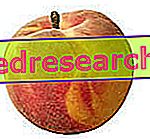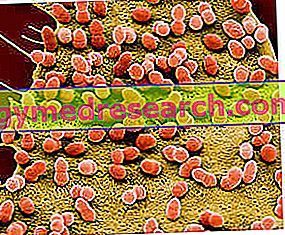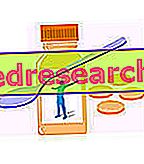Generality
Potassium deficiency - termed hypokalaemia or hypokalemia in medical language - becomes manifest when the concentration of the mineral in the blood is less than 3.5 mEq / l.
Typically, mild potassium deficiencies do not cause symptoms or disorders of any kind. By contrast, severe hypokalemia is a potentially fatal condition due to the appearance of cardiac muscle contraction disorders.
Symptoms and Complications
The clinical symptomatology linked to the lack of potassium includes:
muscle cramps, asthenia, constipation and poor appetite; at times signs of neuromuscular hyper-excitability may appear, which manifest themselves with sudden flashes and spontaneous fasciculations.
In the most serious cases, the lack of potassium can lead to hypoventilation up to respiratory paralysis, bradycardia with changes in the electrocardiographic pattern and cardiac arrhythmias, flaccid paralysis and tendon hyporeflexia, paralytic ileus (intestinal obstruction due to the cessation of peristaltic movements) and polyuria.
Causes
The most common causes that can cause a lack of potassium are:
- disorders and diseases of the digestive tract that cause prolonged vomiting or diarrhea (eg ulcerative colitis, villous adenoma of the colon, repeated enemas, gastric lavage, laxative abuse);
- intense physical exercise, profuse sweating and fluid losses in general (as in extensive burns);
- excess sodium in the diet and insufficient intake of potassium;
- malabsorption syndromes;
- licorice abuse;
- abuse of certain diuretics (potassium ones such as furosemide or thiazide derivatives).
At the base of hypokalemia there may also be primitive or secondary hyperaldosteronisms (liver cirrhosis), insulin therapy (insulin increases the entry of potassium into the cells), diabetes insipidus, kidney diseases, Cushing's syndrome and prolonged intake of corticosteroids.
The reduced dietary intake, isolated from other possible causes of hypokalemia, hardly determines significant potassium deficiencies.
Treatment

The diet can possibly be assisted by specific supplements to be taken orally. Only in the most severe cases or when there are disorders that prevent the oral intake, the potassium salts are administered intravenously.
Among the foods rich in potassium we remember: bananas, apricots, tomatoes, potatoes, legumes and dried fruit (avoid the salty one); also meat and milk have a good potassium content.
Saline and Sport supplements
A possible addition of potassium can be taken into consideration during the hot and humid months, especially in athletes engaged in prolonged efforts and subjected to frequent and abundant sweating (cyclists, marathon runners, etc.); the reintegration of mineral salts, however, is in a certain sense more important in sportsmen, so to speak, improvised, since the body adaptation mechanisms that lead to the saving of mineral salts are not immediate but need a few days.
It should also be emphasized the need not to exceed the recommended dosages, as too much potassium is as dangerous as a deficiency.
In the sports physiology texts consulted, specific potassium replenishment is not recommended, but the importance of an adequate dietary intake and the possible use of hydrosaline drinks (which provide a calibrated intake not only of potassium but also of sodium) is underlined., chlorine, magnesium and small amounts of carbohydrates).
Regardless of the risk of encountering deficiencies, a healthy and balanced diet should contain similar amounts of sodium and potassium; however, many people - although meeting the needs of the latter - tend to exceed the consumption of sodium, a condition that in the long run could favor the appearance of hypertension. Even the contribution of the much demonized sodium (see the specific article on low water content) is however important, especially during the summer months; it is therefore important to limit it without completely excluding it from the diet.



